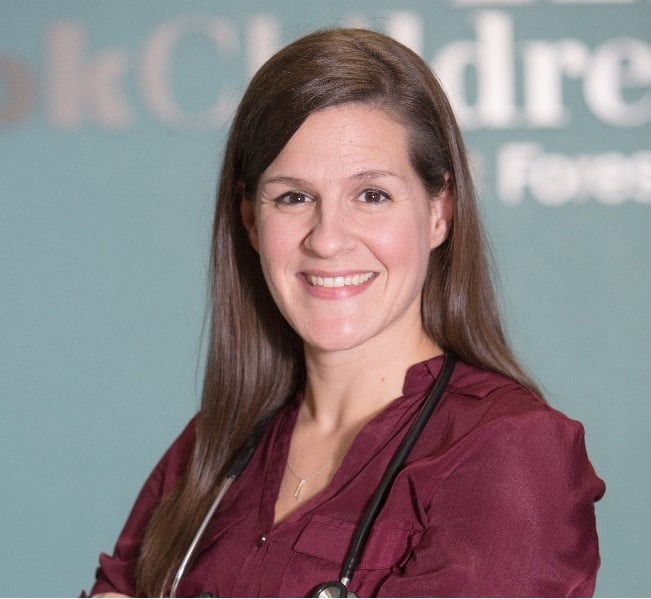New Study Says Antacids, Antibiotics for Infants May Cause Allergies Later in Life
Dr. Diane looks at new pediatric research of why some kids have higher chance for eczema, asthma, food/medicine allergies
 一个有趣的研究发生在了JAMA Pediatrics journal this week.It’s caused a lot of worrisome headlines.
一个有趣的研究发生在了JAMA Pediatrics journal this week.It’s caused a lot of worrisome headlines.
I read the paper during my lunch hour this week. It seems to be a decent study (sometimes studies aren’t that good. Remember that the next time you see an inflammatory headline and try to always read the study, or at least the fine print, for yourself!)
The researchers claim that children who are given antacids or antibiotics in the first six months of life are more prone to “allergic conditions” – like allergies, eczema, asthma, food/medicine allergies, and so on.
这项研究从2001年至2013年的军事卫生系统数据库中观察了超过790,000个孩子。这是一个非常重要的研究。
What it concluded was that if a child got an antacid medication (like Ranitidine or Lansoprazole, amongst others) or an antibiotic (Amoxicillin, Augmentin, Bactrim), the kiddo had a higher chance for those problems listed above.
Antacids in the first 6 months doubled the chance of food allergy. Antibiotics doubled the chance of asthma.
The general thought is that antacid medications and antibiotics mess with our “gut biome.” Those are the living organisms in our gut that help us digest food and help our immune system to know friend from foe.
We want lots of different “good gut bugs” living in there to help us out. When you use antacids or antibiotics early in life, the theory is that this diversity is reduced.
As a mom, I asked myself, “Did those two months my son was on ranitidine cause him to have his awful cantaloupe allergy?” The guilty feelings were already sinking in.
停在那儿!让我们对此感到内疚。我们总是学习,医学总是改变。让我们前进。是的,这项研究似乎是坚实的,但我们可以询问他们的学习方法是什么问题?
如果研究了每种药物,我们都会有更多的了解真正的连接,而不是所有人都集中在一起?
Maybe kids who deal with reflux or infections as babies are just more prone to allergies and illness in general later on in life?
Are military families living in or with environmental conditions which may predispose the kiddos to allergic conditions?
I don’t know the answers to these questions. But boy, is this article making me think!
Like any “big discovery,” do we need more studies on this same topic to reduce any bias and truly know if there is a connection between these medications and allergies?绝对地。We’ve done similar studies on animals in the past, but now it’s time to do more studies on humans.
For me, as a pediatrician, I’m going to walk through these risks with my patients a little more thoroughly.
Children with reflux suffer.I watched it happen in my own kid.Do some of them need the antacids to survive?Absolutely (some kids lose weight with reflux).Will I try to talk parents of children with more “mild” cases of reflux out of it?大概。
Children with bacterial infections need antibiotics.Will I make sure to be certain to use the “least strong” antibiotic I can muster so as not to kill off too many of the important gut biome?绝对地。
This article will no doubt cause some strong opinions. If, in the end, we are using less medication to treat our children’s mild infant illness, I think it will be better for everyone. I look forward to reading more research on this in the future!
Get to know Diane Arnaout, M.D.
 Dr. Diane Arnaoutjoined theCook Children's Willow Parkpractice in 2011.您可以与Facebook上的Arnaout博士和Willow Park练习保持联系。Arnaout博士出生并在达拉斯堡的价值区举起来。她在圣安东尼奥的UT健康科学中心德克萨斯州A&M大学和医学院参加了大学。她在德克萨斯州休斯顿的德克萨斯医疗中心的儿童纪念馆医院和M.D.Anderson的儿童纪念馆和居留权。她是一名董事会认证的儿科医生。点击了解更多信息。
Dr. Diane Arnaoutjoined theCook Children's Willow Parkpractice in 2011.您可以与Facebook上的Arnaout博士和Willow Park练习保持联系。Arnaout博士出生并在达拉斯堡的价值区举起来。她在圣安东尼奥的UT健康科学中心德克萨斯州A&M大学和医学院参加了大学。她在德克萨斯州休斯顿的德克萨斯医疗中心的儿童纪念馆医院和M.D.Anderson的儿童纪念馆和居留权。她是一名董事会认证的儿科医生。点击了解更多信息。

